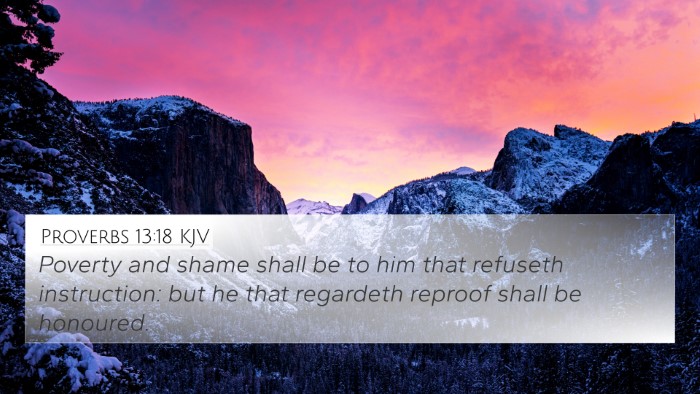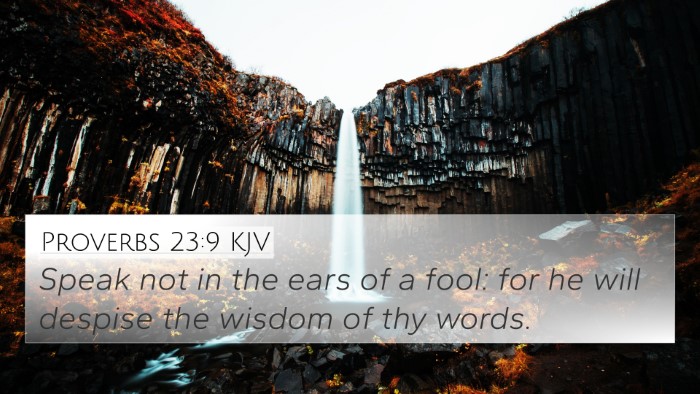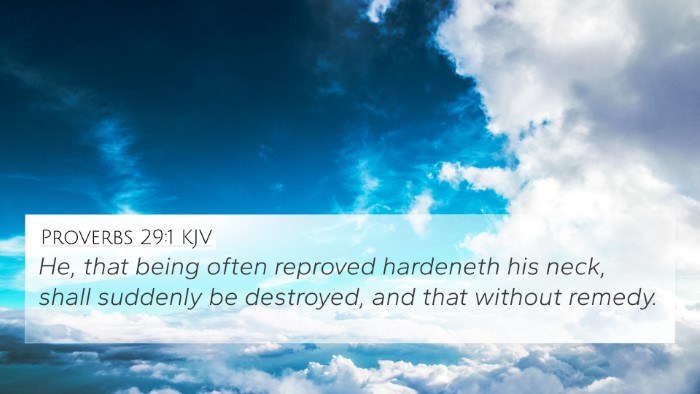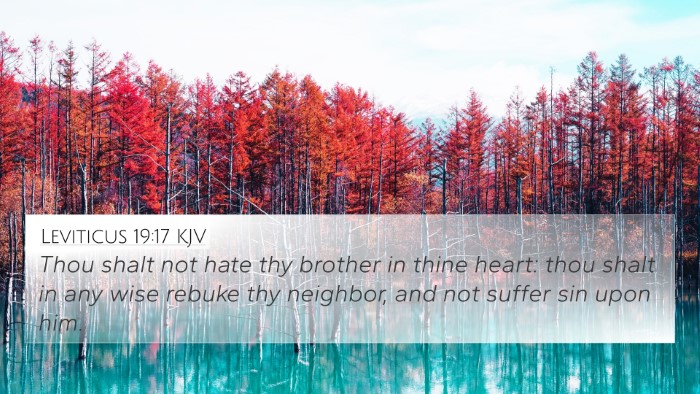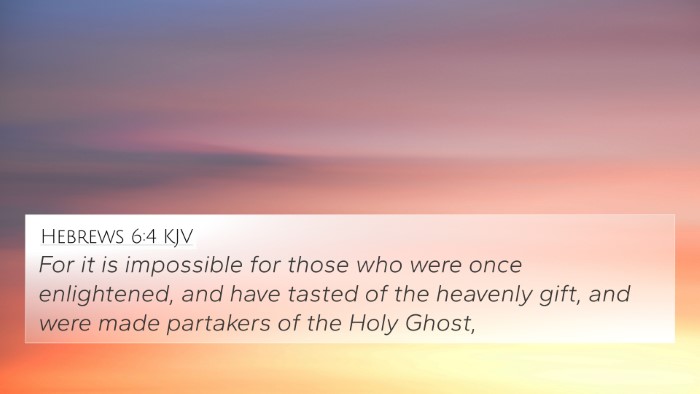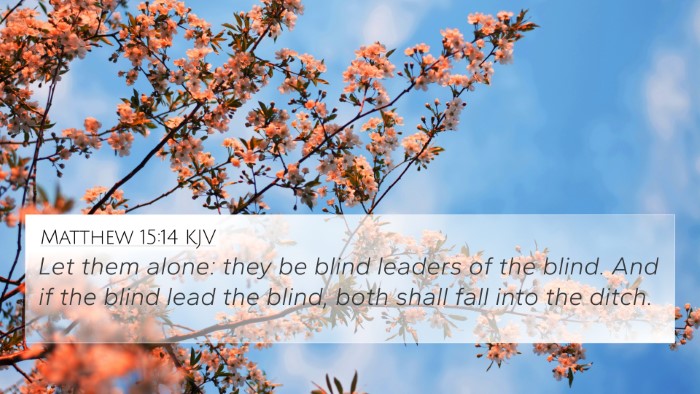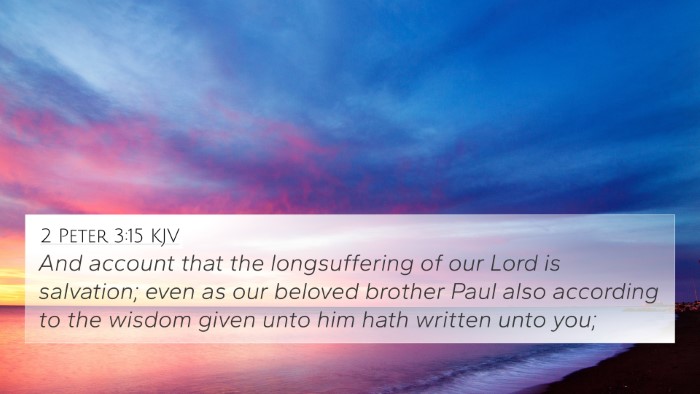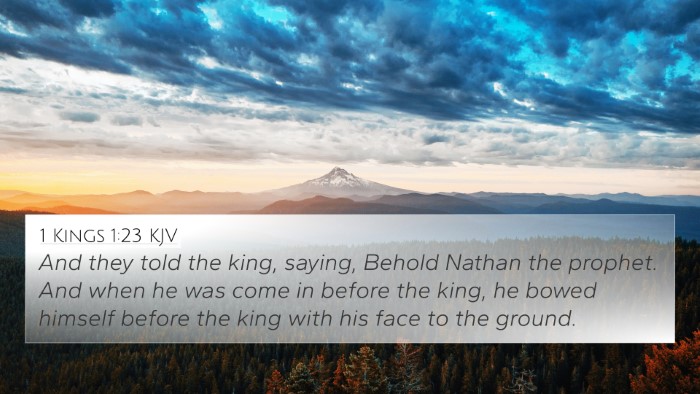Understanding Proverbs 9:8
Proverbs 9:8 states: "Reprove not a scorner, lest he hate thee: rebuke a wise man, and he will love thee." This verse serves as a poignant lesson on the nature of wisdom and folly, emphasizing the importance of discernment in our interactions with others.
Commentary Overview
This verse contrasts the responses of a scorner and a wise man upon being corrected. The scorner, embodying pride and resistance to truth, reacts with hatred when rebuked. In contrast, a wise person, characterized by humility and a desire for growth, receives correction positively.
Insights from Commentaries
- Matthew Henry: He highlights that not all rebuke is welcome and that a wise person appreciates correction, as it leads to further wisdom. He warns against the futility of rebuking those who despise wisdom, which might only provoke hostility.
- Albert Barnes: Barnes emphasizes that a scorner is often beyond the reach of reason, and thus, efforts to correct him are not only pointless but can also be damaging. Conversely, the wise person sees rebuke as a pathway to better understanding and personal growth.
- Adam Clarke: Clarke notes that wisdom entails knowing when to engage in correction and when to refrain. He points out that a wise man welcomes rebuke as an opportunity for self-improvement—a mark of true maturity.
Key Themes
The primary theme of this verse revolves around the nature of wisdom versus folly. Furthermore, it provides insight into human behavior and the effectiveness of corrective advice.
Cross-References
Proverbs 9:8 connects to several biblical verses, enhancing its understanding through cross-references:
- Proverbs 15:12: "A scorner loveth not one that reproveth him: neither will he go unto the wise."
- Proverbs 13:1: "A wise son heareth his father's instruction: but a scorner heareth not rebuke."
- Proverbs 1:7: "The fear of the Lord is the beginning of knowledge: but fools despise wisdom and instruction."
- Proverbs 12:1: "Whoso loveth instruction loveth knowledge: but he that hateth reproof is brutish."
- Proverbs 10:17: "He is in the way of life that keepeth instruction: but he that refuseth reproof erreth."
- Matthew 7:6: "Give not that which is holy unto the dogs, neither cast ye your pearls before swine..." - the importance of proper discernment in offering correction.
- James 1:19: "Wherefore, my beloved brethren, let every man be swift to hear, slow to speak, slow to wrath" - emphasizing wise communication and correction.
Thematic Connections
Proverbs 9:8 resonates with various themes throughout Scripture:
- Wisdom and Understanding: Throughout the Book of Proverbs, the concepts of wisdom and understanding are repeatedly valued, as in Proverbs 4:7.
- The Importance of Humility: Biblical teachings often emphasize that humility is essential for growth, as seen in James 4:10.
- Correction and Growth: The concept of learning through correction is echoed in Hebrews 12:11, where discipline is portrayed as a means for growth.
Practical Applications
When applying Proverbs 9:8 in everyday life, consider the following:
- Evaluate Your Audience: When offering correction, assess whether the individual is receptive to feedback.
- Embrace Correction: Understand that receiving criticism can lead to personal growth and wisdom.
- Cultivate Humility: Foster a humble attitude in your interactions to encourage open dialogue.
Conclusion
Proverbs 9:8 reminds us of the contrasting reactions of the wise and the foolish to correction. By engaging with this verse and its cross-references, believers can better understand the significance of wisdom, the nature of human responses, and the proper context for offering and receiving reproof. This understanding enriches the broader thematic narrative of the Bible on wisdom, humility, and interpersonal relationships.




